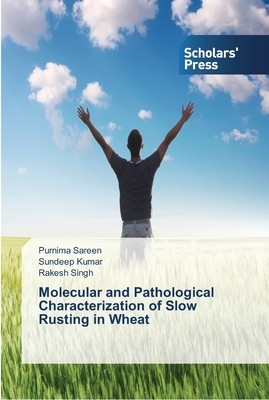
- We will send in 10–14 business days.
- Author: Purnima Sareen
- Publisher: Scholars' Press
- ISBN-10: 3639512022
- ISBN-13: 9783639512021
- Format: 15.2 x 22.9 x 0.6 cm, softcover
- Language: English
- SAVE -10% with code: EXTRA
Molecular and Pathological Characterization of Slow Rusting in Wheat (e-book) (used book) | bookbook.eu
Reviews
Description
Rust diseases specifically leaf rust caused by Puccinia recondita. f. sp. tritici, is globally important fungal of wheat (Triticum aestivum L. em. Thell) that is responsible for significant yield losses; up to 40% worldwide. Due to rapid change of pathogen races, single gene resistance is short lived in wheat cultivars. Alternatively, a more durable form of resistance is attributed to slow leaf rusting for which certain genotypes have been identified and characterized. Genetic studies indicate that slow rusting resistance is under polygenic control with moderately high heritability. Such resistance is controlled by a number of minor genes also referred to as adult plant resistance (APR) genes. Although 10-12 slow rusting genes are known to be present in CIMMYT spring wheat, only two genes Lr34 and Lr46 have been characterized for slow rusting. The present research work was proposed to characterize the effect of different slow rusting gene(s) on spread of leaf rust. This was an indirect selection for desirable allele, to exploit the advantages of the durability of slow rusting and to develop a better understanding about its mechanism that might be of much promising in
EXTRA 10 % discount with code: EXTRA
The promotion ends in 20d.21:46:49
The discount code is valid when purchasing from 10 €. Discounts do not stack.
- Author: Purnima Sareen
- Publisher: Scholars' Press
- ISBN-10: 3639512022
- ISBN-13: 9783639512021
- Format: 15.2 x 22.9 x 0.6 cm, softcover
- Language: English English
Rust diseases specifically leaf rust caused by Puccinia recondita. f. sp. tritici, is globally important fungal of wheat (Triticum aestivum L. em. Thell) that is responsible for significant yield losses; up to 40% worldwide. Due to rapid change of pathogen races, single gene resistance is short lived in wheat cultivars. Alternatively, a more durable form of resistance is attributed to slow leaf rusting for which certain genotypes have been identified and characterized. Genetic studies indicate that slow rusting resistance is under polygenic control with moderately high heritability. Such resistance is controlled by a number of minor genes also referred to as adult plant resistance (APR) genes. Although 10-12 slow rusting genes are known to be present in CIMMYT spring wheat, only two genes Lr34 and Lr46 have been characterized for slow rusting. The present research work was proposed to characterize the effect of different slow rusting gene(s) on spread of leaf rust. This was an indirect selection for desirable allele, to exploit the advantages of the durability of slow rusting and to develop a better understanding about its mechanism that might be of much promising in


Reviews